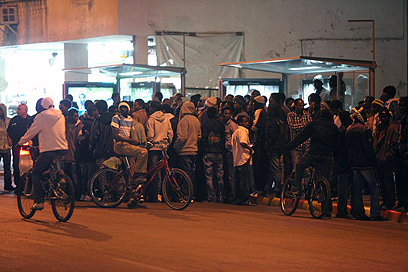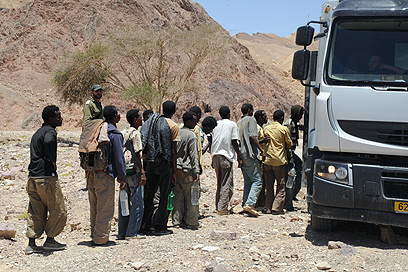
Who are the Sinai infiltrators?
Are Interior Ministry's lack-luster attempts at dealing with infiltration, refugee problem the real reason behind massive influx of 'asylum seekers,' 'migrant workers' into Israel?
The approval of the government program for the "handling of the infiltrators and the migrant workers problem" during the cabinet's weekly meeting has joined the government proposal on the "prevention of infiltration" which will be brought before the Knesset's Internal Affairs Committee on Tuesday.
Related stories:
- Gov't looking to expand deportation scheme Huldai urges PM action on infiltrator issue
- Migrant workers won't lose visa for pregnancy
Its purpose is allowing the arrest of asylum seekers and their children for a minimum of three years and in certain cases, for an unlimited period of time.
"Infiltrators", "asylum seekers", "refugees" or maybe "migrant workers"? Who are the people crossing the southern border in their thousands and what is the problem?

Infiltrators in Tel Aviv (Photo: Moti Kimchi)
According to Immigration Authority data, there are 43,000 "foreigners who entered Israel through the Egyptian border illegally and were caught at the border or within the State" living in Israel today.
2005 is considered a watershed year with regards to infiltrators – it is the year when a trickle of infiltrators turned into a stream of thousands. It was the year that saw the Egyptians toughening their attitude towards infiltrators from African countries during which there were reports of infiltrators being fired at and tortured by Egyptians.
Moreover, the African immigration route to Europe was blocked after the Libyan dictator signed an agreement with Italy that would allow the return of refugees. Thus, Israel became the preferred destination and last month a record 2,600 Africans arrived in Israel.
At the same time, a flourishing migrant smuggling industry emerged. Bedouin smugglers who transport the infiltrators through Sinai and aid them in crossing the border receive huge sums for their efforts, a sum of up to $2,500 per person.
When questioned the infiltrators paint a harsh picture of torture, abuse, violence and rapes until the border is reached.

Crossing the border in Egypt (Photo: Yair Sagi)
So who are the tens of thousands? Some 15% of all infiltrators come from various African countries and most of them come here in search of work. But over 85% of them are from Sudan and Eritrea, countries with a catastrophic human rights record.
According to the International Refugee Convention from 1951, of which Israel is a founding signatory, a refugee is "someone who is unable or unwilling to return to their country of origin owing to a well-founded fear of being persecuted for reasons of race, religion, nationality, membership of a particular social group, or political opinion."
The convention obliges countries that have refugees within their borders to make sure they are not sent back to places where they might be in danger and to care for their welfare and give them access to healthcare services, welfare and education.
Except requests for refugee status are hardly ever received in Israel and the reason is simple and stems from a deliberate policy being carried out by the Interior Ministry in the last few years: No one is carrying out the needed examinations to receive refugee status.
Inevitable result
The infiltrators are taken to a special facility by the IDF where they are questioned by the Immigration Authority's Passport Control officials. Those arriving from Sudan and Eritrea automatically receive asylum seeker status – which is not the same as refugee status and does not offer them any rights other than the collective right of not being expelled.
Amnon Ben Ami, director of the Interior Ministry's Population, Immigration and Borders Authority explained: "The questioning aims to examine the purpose of the arrival in Israel and it reveals that 98% of the infiltrators are seeking work.
"Only a very few fulfill the criteria determined by the UN for refugee status. The others all declare that they are here to work and try to discover if they can send money back to their families."
The inevitable result of the insufficient questioning of infiltrators from Egypt is that even those who have no right or reason to receive asylum seeker status, and who could technically have been sent back to their country of origin, remain in Israel on the strength of collective protection. Thus, huge communities of infiltrators began to gather on the periphery of Israel's towns and cities.
This, without any real attempt by the State to deal with the problem. "Because the Interior Ministry tried to avoid awarding refugee status to some of the infiltrators, it has, with its own hands created the huge infiltration problem," a source within the Tel Aviv Municipality stated.
- Receive Ynetnews updates directly to your desktop










